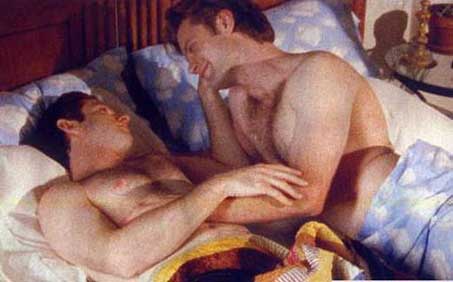
 |
||||||
|
GAY
FILM REVIEWS BY MICHAEL D. KLEMM
|
||||||
|
Urbania Trimark Home Video, 2000 Director: Jon Shear Screenplay: Starring: Rated R, 105 minutes
|
Take
A Walk On The Wild Side
"Heard any good stories lately?" a young man asks the audience. "I've got a good one. And this one really happened. Give me a second to figure out the ending." This is the set-up for Urbania, one of the most interesting films, gay or straight, that I have seen in a long time. Urban folk tales come to life around Charlie, a gay man whose life is unraveling at the seams. Charlie has a story to tell us and what a tale it is; recounted through flashbacks, flash-forwards, urban legends and hallucinations. While searching for closure, he discovers that he is about to become an urban legend himself.
Charlie is angry, frustrated and horny. He repeatedly calls his own answering machine to hear his former lover's voice, and begs him to pick up the phone. Back at his apartment, he stares at the empty side of his bed. Hearing the sounds of lovemaking in the apartment upstairs, he begins to masturbate but then stops when his other hand finds a recent scar on his chest. Going outside, he finds no peace in the night. Walking past a deserted street, a violent memory erupts when he sees two men stroll by, holding hands.
Charlie is one of the most complicated characters ever presented in a gay film. His motivations aren't entirely clear from the onset as director Jon Shear deliberately misleads the audience on numerous occasions. Flashbacks suggest that Charlie was once deeply in love but now that man is gone. Is Dean, the mysterious man at the bar, connected in some way with Chris' disappearance? Is Charlie trying to pick Dean up or does he hold a different agenda? To reveal any more of the plot would be a disservice to my readers. This is a film whose riches are best discovered as the tale unfolds. |
 |
|
|
What could have been a simple tale is instead filled with layers of meaning. What makes Urbania so unique is the way in which many familiar urban folk tales (such as the man whose kidney is stolen, the boiled rat served by a hot dog vendor, or the woman who puts her wet dog into a microwave) weave in and out of the narrative. These urban legends all seem to be about people who find themselves in situations where they lose control, and Charlie is desperately trying to regain that control. The people around Charlie are continually telling these tales and, at times, the tales literally come to life around him. Like Leopold Bloom's wanderings through Nighttown in James Joyce's Ulysses, (and, similarly, Tom Cruise in Stanley Kubrick's Eyes Wide Shut and Griffin Dunne in Martin Scorcese's After Hours), Charlie drifts through the night streets and encounters one strange apparition after another. Charlie has fallen down a rabbit hole and he no longer knows what it is real and what is not. Reinforcing the Alice's Adventures Through The Looking Glass theme, the director repeatedly offers up images of Charlie's reflection in mirrors or close-ups of his eyes. The cinematography is grainy with saturated color to give the film itself the feel of an urban legend; a gritty documentary heightened by stylized reality.
Dan Futterman is superb as Charlie. Gay viewers may remember him as Robin Williams' son in The Birdcage. The intensity of his acting in Urbania came as a great surprise. The supporting cast is also top-notch, especially Alan Cumming as his dying friend, Brett. Josh Hamilton is also quite lovable as the bartender, and Lothaire Bluteau (Bent) is unforgettably pathetic as a homeless man whom Charlie befriends. Samuel Ball is chilling as Dean, the homophobic closet case that Charlie finds himself drawn to. Urbania is a very heavy and intense film, broken up by ample doses of dark humor and Charlie's (probably) idealized memories of his lost relationship with Chris. The flashbacks between Charlie and Chris (Matt Keeslar) are among the sexiest and most romantic love scenes between two men ever filmed and help ease Urbania's almost-unbearable tension. Urbania can be rented at video stores everywhere. DVD collectors will be interested to know that the disc includes a very enlightening director and cast commentary, along with deleted scenes. The director also discusses, in a featurette, how he filmed Urbania in Super 16mm and then edited it on a digital computer and it is quite instructional for budding filmmakers.
More On Dan Futterman: More On
Matt Keeslar: William
Sage also appears in: Christopher
Bradley appears
in:
|